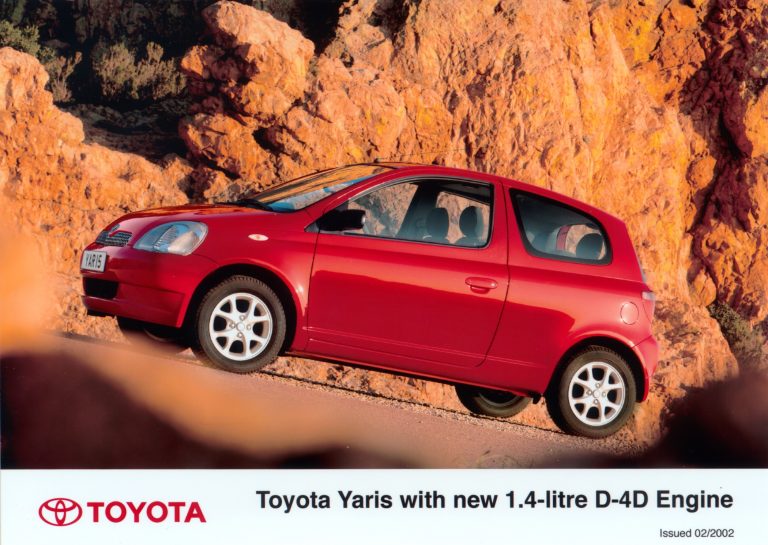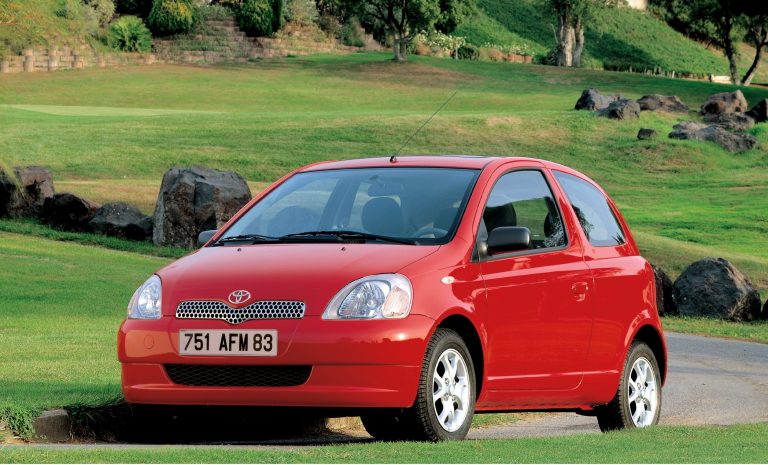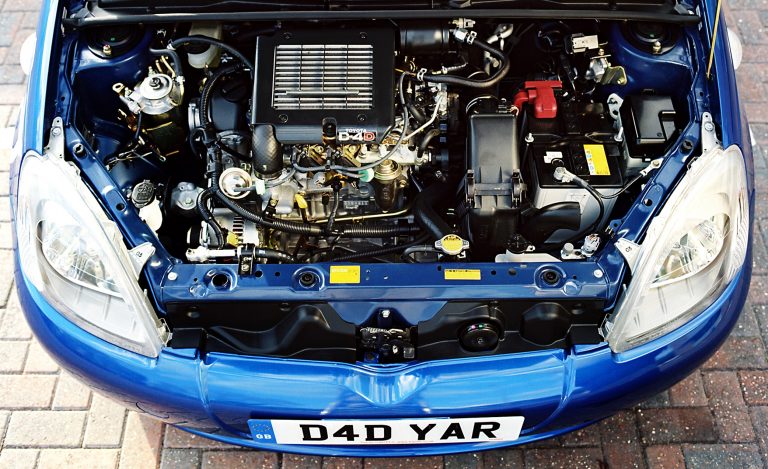Toyota Yaris And Yaris Verso D-4D
KEY POINTS
- New D-4D common rail diesel engines broaden appeal of popular Yaris range
- Available in all grades of Yaris except SR and T Sport and both grades of Yaris Verso
- D-4D engine produces 74bhp at 4,000rpm with 170Nm of torque available from just 2,000rpm – power equivalent to that of many competitor petrol engines with a similar displacement
- Range of over 650 miles attainable from low combined fuel consumption of 67.3mpg for Yaris S and Yaris GS
- 1.4 D-4D is the seventh diesel engine currently offered by Toyota, one of the world’s largest manufacturers of diesel engines
- Cylinder head, block and air-air intercooler all manufactured from alloy resulting in a very low engine weight of just 99kg
- 1.4 D-4D complies with Euro step III emissions and has a CO2 figure of 113g/km for Yaris S and Yaris GS and 133g/km for Yaris Verso
- Yaris D-4D accelerates from 0-62mph in 12.9 seconds and has a top speed (where permitted) of 106mph. Yaris Verso accelerates from 0-62mph in 13.8 seconds and has a top speed (where permitted) of 99mph
- ABS with Electronic Brakeforce Distribution (EBD) fitted as standard on all Yaris and Yaris Verso models
- Available in the UK from 4 March 2002
- Extended service intervals and low maintenance costs
- Over 1.1 million Yaris sold worldwide since its introduction in 1999
NEW COMMON RAIL 1.4 D-4D DIESEL ENGINE FOR YARIS AND YARIS VERSO
On 4 March 2002, Toyota add the new Toyota Yaris 1.4 D-4D, a modern, fuel-efficient and fun to drive common rail diesel engine to its top selling Yaris model range. The new engine broadens the appeal of the already successful Yaris – European Car of the Year 2000 – and opens up new market opportunities for the cute little Toyota.
The new diesel engine uses a turbo specifically developed by Toyota utilising an air-air intercooler to produce 74bhp at 4,000rpm, and 170Nm of torque available from 2,000-2,800rpm. Special attention has been paid to the drivability of the engine, with a high priority given to environmental friendliness, quality and durability.
The Yaris and Yaris Verso D-4D are being launched at a time of unprecedented growth in the UK diesel market and represent a further opportunity for Toyota to build on the record sales of 2001.
This new market opportunity can only add to the outstanding success of Yaris. Since launch, more than 74,000 have been sold in the UK and over 1.1 million worldwide.
TOYOTA AND THE DIESEL MARKET
A segment that is more significant in terms of volume, is that of the diesels. Furthermore, the image of the diesel engine has changed so much over the last decade in Europe, that it has created its own aspirational value: diesels these days are considered as high tech and ecological.
The rapid awareness of diesel in the passenger car market is a typically European phenomenon. In 2000, 37 per cent of all passenger cars sold in Europe were powered by a diesel engine. In 1990, that figure was only 19 per cent. Neither Japan nor the North American markets have seen a similar movement.
Toyota aims to sell about 36,500 units in Europe of its Yaris with 1.4 D-4D engine, and a further 10,400 units of the Yaris Verso 1.4 D-4D in 2002 – the first full year of sales. Compared to the annual total sales of the Yaris range, this means that approximately 35 per cent of all Yaris sales are projected to be diesels.
The introduction of the D-4D engine to the Yaris range will give Toyota some 47,000 additional sales, important in reaching Toyota’s target of 800,000 units of annual sales in Europe by 2005, equivalent to five per cent market share.
Smooth Linear Torque to Match a Petrol Engine
Traditionally, diesel engines provide driving pleasure in a different way than petrol engines. What they lack in output, they make up for in torque. In today’s busy traffic, that can be a benefit. However, most diesel engines have the additional handicap that the torque they provide is only available over a small rev-range.
When creating the 1.4 D-4D engine, Toyota engineers strove to overcome both the lack of outright power output and the limited usable rev-range. With a power output of 74bhp, the 1.4 diesel produces power that is equivalent to that of many competitor petrol engines with a similar displacement.
Furthermore, the engine manages to produce the same type of linear torque-increase that is associated with a petrol engine, but with the top levels of torque that are provided by a diesel engine.
Yaris produces 170Nm of torque between 2,000 and 2,800rpm with 90 per cent of this value available at just 1,800rpm. But as the engine-speed increases, enough torque remains available to maintain the car’s momentum. As a result, a driver can hold a gear much longer, without experiencing the sudden drop in power once the ideal rev-range has been exceeded.
Petrol-Like Performance
Acceleration from rest to 62mph is reached in just 12.9 seconds in the Yaris, the Yaris Verso takes 13.8 seconds to achieve the same speed. Top speeds are 106mph for the Yaris and 99mph for the Yaris Verso, figures that stand up to those of many petrol engines with a similar displacement.
The engine was tuned to be as fluent in its performance as possible, without shocks and with a comfortable rather than a sudden and jerky response to inputs from the accelerator.
Noise Reduction
A number of measures were taken to reduce noise and vibration. The engine is extremely quiet thanks to its design and operation, with pilot injection and a more progressive burn in the combustion chamber to reduce ignition shock, which causes the old, distinctive diesel engine knock. Noise and vibration levels were further improved through the addition of sound proofing material and several engine covers (cylinder head, timing chain and oil sump).
Fuel Consumption
The ultimate criterion for a diesel engine is its consumption. Not that long ago, this consideration had a purely economical foundation. But these days, low consumption is also favoured because it helps the environment and a fuel-efficient engine also has to be a high-tech engine. Low consumption is high image.
Thanks to the use of an intercooler and the implementation of a second generation Bosch common rail system, very low fuel consumption targets could be met, and Yaris beats its competitors with a combined fuel consumption of 67.3mpg (Yaris S and GS).
Light Weight – Low Thirst
Diesel engines are, by default, heavier than a petrol engine of similar capacity. For this reason, Toyota also made a considerable effort in reducing the new engine’s weight with the purpose of maximising the gain in fuel economy. Both the cylinder head, block and air-air intercooler are made of aluminium alloy. As another clever way to save space and weight, the Toyota turbocharger is completely integrated into the exhaust manifold and the alloy intake manifold is also integrated into the cylinder head. This has resulted in a weight of just 99kg for the 1.4 D-4D engine.
Extensive testing and tuning has been carried out to ensure the engine also delivers its outstanding efficiency in real-life circumstances. Thanks to the ultra-low consumption, Yaris D-4D has a range of more than 650 miles (S and GS) between refuelling.
Environmentally Friendly
As diesel engines have become more sophisticated, their environmental friendliness has improved. The sheer fact that the engine is highly fuel-efficient already reduces its effect on the environment. The further addition of an exhaust gas recirculation unit (EGR) helps to reduce NOX emissions, and particulate emissions are cut as well. The new engine complies with Euro Step III regulations, and has a CO2 rating of 113g/km for Yaris hatchback (S and GS) and 133g/km for Yaris Verso. Thanks to the low emissions ratings, both D-4D models qualify for the lowest VED banding at £110 per year.
Quality, Reliability and Pricing
One of the traditional values of the Toyota brand, is the quality it offers to its customers.
It was clear from the outset that despite the extremely high performance and efficiency of the new engine, no compromise in terms of durability and reliability could be accepted.
When development work had finished, more than 950,000 miles of testing had been carried out to ensure the unmatchable Toyota reliability and durability. The Yaris and Yaris Verso D-4D are sold with Toyota’s usual three-year/60,000 mile warranty together with three-year paint and 12 year anti-perforation warranty.
In line with all of Toyota’s recently introduced new models, trips to the dealer are few and far between with minor servicing and a Health Check being required every 10,000 miles. Major servicing is required at 20,000 miles or every two years.
Pricing for Yaris and Yaris Verso D-4D are as follows:
Yaris and Yaris Verso D-4D – On the road price
- Yaris S 1.4-litre D-4D 3 door with PAS – £8,395
- Yaris GS 1.4-litre D-4D 3 door – £9,395
- Yaris GS 1.4-litre D-4D 5 door – £9,895
- Yaris GLS 1.4-litre D-4D 3 door – £10,395
- Yaris GLS 1.4-litre D-4D 5 door – £10,895
- Yaris CDX 1.4-litre D-4D 5 door – £11,895
- Yaris Verso GS 1.4-litre Mini MPV – £11,395
- Yaris Verso GLS 1.4-litre Mini MPV – £12,395
YARIS AND YARIS VERSO 1.4 D-4D TECHNICAL SPECIFICATIONS
|
ENGINE |
|||
|
Type |
In line transverse 4 cyl, front wheel drive |
||
|
Valve mechanism |
SOHC 8 valve – chain driven |
||
|
Bore x stroke (mm) |
73.0 x 81.5 |
||
|
Displacement (cc) |
1364 |
||
|
Compression ratio |
18.5:1 |
||
|
Max power bhp / rpm |
74 @ 4,000 |
||
|
Max torque Nm / rpm |
170 @ 2,000-2,800 |
||
|
ACCELERATION |
YARIS |
YARIS VERSO |
|
|
0-62mph (manual gearbox only) |
12.9 |
13.8 |
|
|
Maximum speed (mph) |
106 |
99 |
|
| FUEL CONSUMPTION, EMISSIONS AND VED RATING |
S/GS |
GLS/CDX |
|
|
Combined |
67.3 |
64.2 |
56.5 |
|
Urban |
55.4 |
53.3 |
47.0 |
|
Extra Urban |
76.3 |
74.3 |
64.2 |
|
CO2 g/km |
113 |
117 |
133 |
|
VED Band |
A (£110) |
A (£110) |
|
|
DIMENSIONS |
|||
|
Overall length (mm) |
3615 |
3860 |
|
|
Overall width (mm) |
1660 |
1690 |
|
|
Overall height (mm) |
1500 |
1715 |
|
|
Interior room length (mm) |
1800 |
1905 |
|
|
Interior room width (mm) |
1380 |
1370 |
|
|
Interior room height (mm)(sunroof) |
1265(1195) |
1290 |
|
|
Wheelbase (mm) |
2370 |
2500 |
|
|
Track width (mm) front (175/65R14 tyre) |
1440 (1450) |
1440 |
|
|
Track width (mm) rear (175/65R14 tyre) |
1420 (1430) |
1420 |
|
|
Overhang (front) |
720 |
725 |
|
|
Overhang (rear) |
525 |
635 |
|
|
Coefficient of Drag (Cd) |
0.30 |
0.31 |
|
|
Fuel tank capacity (l) |
45 |
45 |
|
|
Luggage capacity (l) min/max |
205 / 305 |
390 / 2160 |
|
|
Minimum turning radius (m) tyre/body |
4.9/5.2 |
5.1/5.4 |
|
|
Kerbweight (kg) |
1015-1040 |
1090-1135 |
|
|
Gross vehicle weight (kg) |
1400-1415 |
1530 |
|
|
SUSPENSION |
|||
|
Front |
MacPherson strut, anti-roll bar |
||
|
Rear |
Torsion beam, anti-roll bar |
||
|
GEARBOX AND FINAL DRIVE RATIOS |
|||
|
First |
3.545 |
||
|
Second |
1.904 |
||
|
Third |
1.310 |
||
|
Fourth |
0.969 |
||
|
Fifth |
0.725 |
||
|
Reverse |
3.250 |
||
|
Final drive ratio / Yaris Verso |
3.526 / 3.941 |
||
|
BRAKES |
YARIS | YARIS VERSO |
|
Front |
Ventilated discs |
|
|
Rear |
Drums |
|
| STEERING | ||
|
Type |
Rack and pinion, power assisted |
|
|
Turns (lock to lock) |
3.2 |
|
|
Ratio |
17:1 |
|
| TYRES & WHEELS | ||
|
Wheel size S / GS,GLS & CDX, Verso |
13 inch/14 inch |
|
| Tyre size (S) GS,GLS & CDX, Verso GS, GLS |
(155/80R13) 175/65 R14 |
|
|
Spare tyre |
Space saver |
|
ENDS




